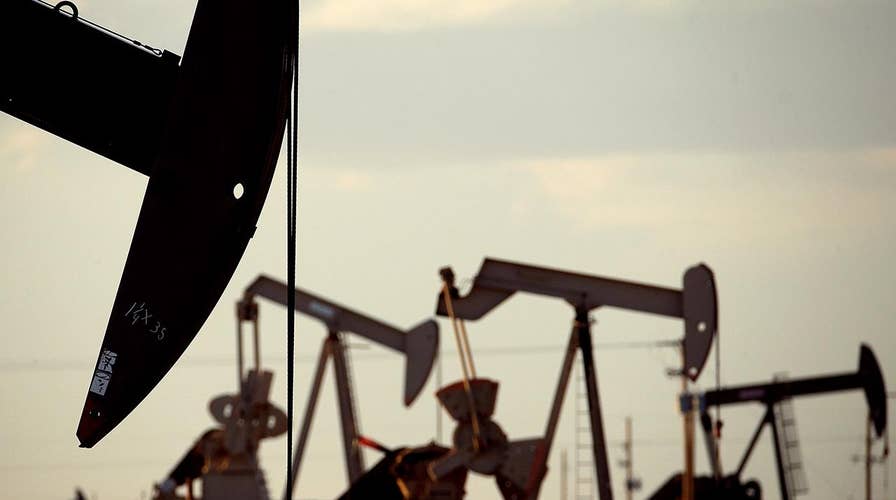Oil prices drop after Trump tells OPEC prices are too high
Oil prices sank after President Trump urged OPEC to lower the cost of crude over Twitter.
The Organization of Petroleum Exporting Countries (OPEC) – an international cartel that controls more than 80 percent of the world’s oil reserves – has colluded and manipulated oil production, and therefore oil prices, to the detriment of U.S. industry and consumers for decades.
Yet despite the harm OPEC is causing us, America’s military might is deployed daily to protect the oil shipping lanes in the Persian Gulf used by Saudi Arabia and other OPEC members in the Middle East, at a cost to U.S. taxpayers of at least $81 billion annually.
Doesn’t seem right, does it?
TRUMP CALLS ON OPEC TO HIKE OUTPUT AS US GAS PRICES POISED TO RISE
OPEC openly and blatantly engages in price-fixing – behavior that is illegal in any other industry. But while companies in other industries face prosecution if they collude to fix prices, OPEC producers have thus far evaded the rule of law that applies to everyone else by cloaking themselves in the flags of their respective countries.
The OPEC members hide behind doctrines and precedents typically reserved for state activity to protect their anti-competitive commercial activities, while even some state activities themselves have been subject to legal scrutiny.
It’s vital that we apply the same standards to the international oil industry as we do to other industries, because of oil’s importance to our economy. Fortunately, Congress has moved to address this threat.
Bipartisan legislation in the House and Senate – called the No Oil Producing and Exporting Cartels Act (NOPEC) – would amend the Sherman Antitrust Act to allow the U.S. Justice Department to prevent OPEC or its individual members from using a sovereign immunity defense or the Act of State doctrine to evade U.S. antitrust law.
Encouragingly, the House version of the NOPEC bill passed out of committee the same day the Senate version was introduced.
A recent legal analysis by antitrust law experts Harry First and Darren Bush makes clear that NOPEC is consistent with U.S. antitrust policy and practice, that concerns with retaliation by OPEC nations are overblown, and that if the NOPEC bill becomes law it would provide the federal government with a valuable tool to combat OPEC’s collusive behavior.
OPEC openly and blatantly engages in price-fixing – behavior that is illegal in any other industry.
In the past, President Trump has expressed the same view. In his 2011 book “Time to Get Tough,” Trump wrote: “The way to fix this is to make sure that Congress passes and the president signs the ‘No Oil Producing and Exporting Cartels Act’ (NOPEC).”
The truth is that OPEC is really more than just a cartel out to make as much money as possible. It is a cabal of countries with national interests often very different from those of the United States.
Those of us old enough to remember the Arab oil embargo of 1973 might understandably fear that enacting NOPEC could spark retaliatory action against the United States by OPEC nations. Other threats involve selling assets owned by these countries in America or locking out our companies from their countries.
These are the same threats that are commonly broached but rarely if ever used against a country with the economic power of the United States. Moreover, less of our economy today depends on oil as we have grown more efficient since 1973 and domestic record production continues to increase America’s own pool of resources.
By employing innovative drilling techniques to unlock America’s oil shale reserves, U.S. oil producers have rewritten the energy rulebook in recent years to produce vast supplies of domestic crude, reinvigorating communities and re-establishing the United States as an energy powerhouse.
However, oil is a globally priced commodity, meaning events that disrupt output anywhere affect prices everywhere. So for as long as the United States retains its overwhelming dependence on oil as a transport fuel – and we rely on petroleum to power 92 percent of transportation today – our country will never be able to realize true energy security.
OPEC’s response to this surging domestic production has been strong. Starting in November 2014, members of the cartel that is led by Saudi Arabia agreed among themselves to maintain high levels of production, sending the more market-based oil prices that U.S. shale then relied upon into freefall.
As oil prices fell from $110 per barrel in June 2014 to just $26 by February 2016, more than 200 U.S. energy companies filed for bankruptcy, taking approximately 200,000 jobs with them. Parts of the U.S. that had enjoyed the energy boom were shoved back toward recession.
These disturbing developments occurred because OPEC’s role in the international oil market puts the American economy at the mercy of countries in an unstable region that do not share our interests.
Over the long term, America can achieve energy security only by diversifying the sources of fuel in the transportation sector. But for now and for some years to come, our economic wellbeing and national security will depend on the world oil market.
In the past, we could only deal with OPEC by asking Saudi Arabia to maintain oil production. The kingdom has granted American requests on some occasions, and on some occasions it has not.
CLICK HERE TO GET THE FOX NEWS APP
Enacting NOPEC would give the U.S. punitive actions in our arsenal to respond to OPEC’s unfair actions. NOPEC would show the cartel that the United States is serious about countering the artificial pricing that frequently harms American businesses and consumers.
The bottom line is that NOPEC would enhance U.S. energy security and U.S. national security. Congress should pass this important legislation this year and President Trump should sign it into law, to benefit our nation and the American people.

